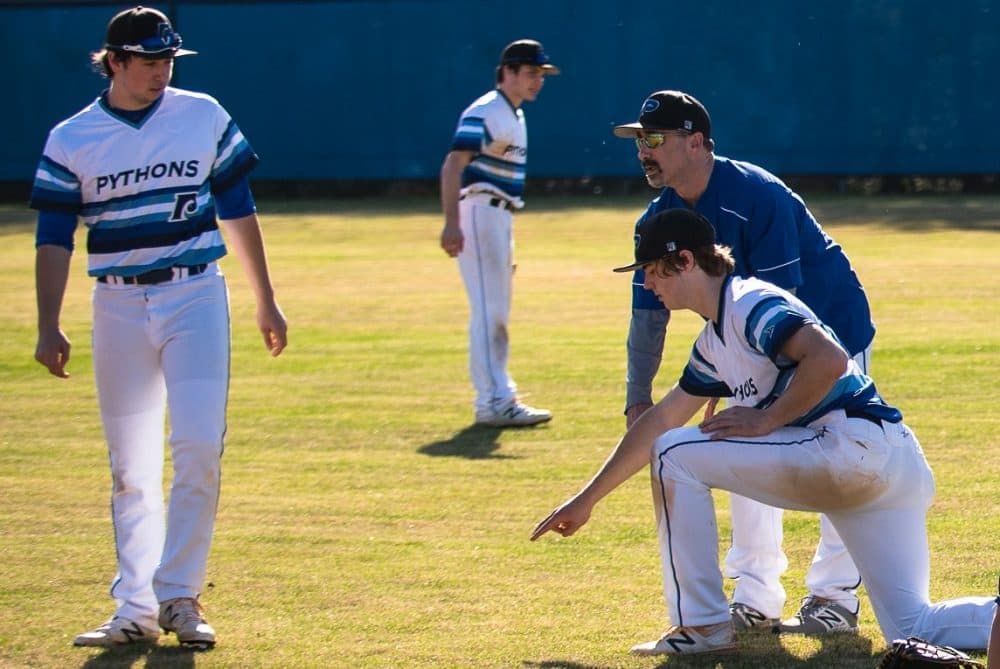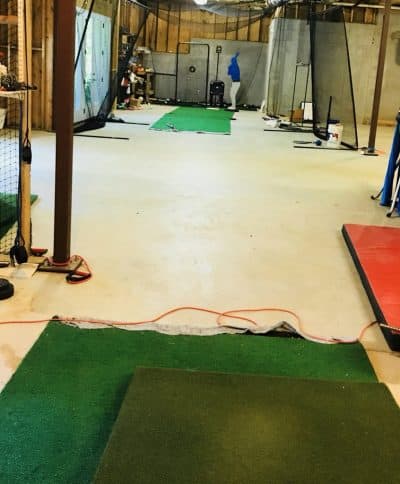Advertisement
@PitchingNinja Vs. MLB: Lessons From A Twitter Showdown
Resume
Rob Friedman is a lawyer living in Atlanta, Georgia. He's also known as the "Pitching Ninja."
"Only on Twitter," Rob says. "That'd be awkward at home."
@PitchingNinja isn’t one of the 27 people Yahoo! Sports writer and podcast host Jeff Passan follows from his official Twitter account.

"I do have a burner account, however, from which I follow him," Passan says. "Let's put it this way: I'm very familiar with his work, as is more or less everybody in the baseball Twitter subculture."
Rob’s work began long before he came to Twitter. He’s been coaching since his son was 6 years old. That same son will soon head off to pitch for Georgia Tech. Rob taught himself everything he could about the game, especially the mechanics of pitching. He even built a pitching facility in his basement. He invites people over to learn.
"I have a 75-foot-long, 40-foot-wide basement," Rob says. "So it's not like this little cramped space."
Rob shares what he’s learned out of his love for the game. He’s never gotten paid for it.
"I'm strange that way, I guess," he says. "Money, kind of, ruins it sometime."
But about four years ago, Rob found that teaching people in his basement just wasn’t enough anymore. So Rob took to Twitter as the Pitching Ninja.
The Evolution Of @PitchingNinja
Rob tried to distill his pitching advice down to 140 characters. But he’s always been a visual learner. So he started grabbing small snippets of MLB games from the internet — just individual pitches — slowing them down, laying them on top of one another and uploading them as looping videos called GIFs.
"When you look at a GIF that the Pitching Ninja puts up there, it's going to be a baseball moving unlike physics tell you it should," Passan says. "It's just watching something and saying to yourself, 'Oh, my god. How does a baseball do that? And how does a pitcher make a baseball do that?' "
"Sometimes it's just an individual pitcher's mechanics, or how their body works," Rob says. "Other times it's just nasty pitches, stuff that I've seen, and I go, 'Holy cow, that's ridiculous.' And maybe it helps people understand how good pitchers are."
As it turns out, there was a lot of interest in what the Pitching Ninja was doing, in part because Rob started highlighting "nasty" pitches as pitches started getting nastier.
"Fastballs are faster than they've ever been before, breaking balls move more than they've ever moved before and the quality of pitching is better than it has ever been," Passan says.
By April 2018, Rob had 45,000 Twitter followers. And it wasn’t just high-school coaches and aspiring major leaguers who were following @PitchingNinja. Rob was getting comments from actual major league pitchers.
"They will contact me and say, 'Did you see that?' Or, 'Can you overlay it with another pitch that I threw, so I can see how that moved?' " Rob says. "It's a little surreal sometimes."
Rob says he spends four to five hours a day watching multiple games at a time, following up on leads sent to him by his followers and creating his GIFs. But as a lawyer, Rob knew that taking video from MLB broadcasts was in a gray area, legally speaking. And it was a gray area that, from the beginning of the internet, Major League Baseball has been defending and claiming as its own. Passan says it’s the opposite of what the NBA has done.
"The NBA said, 'We are going to let you share everything, because we feel like you as the fan, someone who wants to consume our product, can be our greatest evangelist,' " Passan says. "Major League Baseball, however, had said, 'Our product is the most important thing to us, and we want to be the ones to control it. We don't want to let it out there unfettered.' "
The MLB Brand
In a lot of ways, Passan says, Major League Baseball has more to lose than the NBA. It started nearly two decades ago, when the league invested in an in-house media organization called MLB Advanced Media.
"Streaming video came along," he says. "And so they built this huge infrastructure in New York off of an original $90 million investment from the clubs that has turned into this absolute windfall for teams that reaped $50 million each last year alone."
People in the industry call MLB Advanced Media by a shorter name: BAM. According to Passan, BAM is currently valued at anywhere from $3 billion to $5 billion.
So the worry is this: If Major League Baseball allows fans to share its streaming video willy-nilly all over the internet, streaming video might become less valuable. And this, in turn, might make BAM less valuable.
But there’s another thing to consider, Major League Baseball’s most important brand: the game of baseball. It’s losing ground, especially with a younger audience — the same audience that might watch GIFs on Twitter and then be inspired to actually tune in to a three-hour game.
Major League Baseball owns the video snippets Rob was sharing, but he never thought he was doing anything that would harm the game.
"That I can say with 100 percent certainty," he says. "I only wanted to help it."
"It's such a benign thing," Passan says. "For a sport that struggles to connect with youth, it was baseball shooting itself in the foot."
"I Checked My Phone, And It Was Blowing Up"
The kerfuffle began in mid-April when Kevin Clancy, a podcaster for Barstool Sports, retweeted one of @PitchingNinja’s GIFs.
The first time, Clancy retweeted it in a way that made it clear that Rob had created it. The second time, he just sent it out.
"We all know Major League Baseball owns it, but I actually slowed down the video to show how the ball was moving," Rob says. "I kinda called him on it and said, 'Hey man, nobody takes somebody else's stuff and then puts it out as if it's their own.' "
With the honor of one of their own called into question, Barstool fans did what Barstool fans do: They blew up the internet. And then they reported @PitchingNinja to Major League Baseball. Passan says the league already knew about Rob’s account, but now they had to address the issue … publicly. Rob went to bed that night knowing that it all might come to a head.
"I wake up in the middle of the night. And I checked my phone, and it was blowing up," Rob says. "I was getting contacted by a ton of folks."
At the request of Major League Baseball, the @PitchingNinja account had been suspended by Twitter. Rob couldn’t tweet, but he could see what people were tweeting about him.
"Major league pitchers, they were upset," Rob remembers. "I had front office guys for Major League Baseball teams tweeting out, 'Hey, what's going on with Pitching Ninja's account?' I felt like George Bailey, in 'It's a Wonderful Life,' when you see how the world was like when you're not there."
Maybe it was that thought that led Rob to do what he did next. He went back to sleep. And the next morning...
"My wife didn't know that I knew," he says. "She's like, 'How are you doing? I mean, you know your Twitter's down, right?' And I was like, 'I'm fine. It'll work out.' "
And here’s the crazy thing. Rob was right. It did work out.
A Big-League Deal
"The uproar and the outcry, I think, made baseball rethink its position," Passan says. "Ultimately, if the upshot from this whole kerfuffle is that we get to see cool breaking balls with crazy adjectives attached to them, everyone is better for it."
Rob worked out a deal. He now creates his GIFs as an independent contractor for Major League Baseball. Since April, @PitchingNinja has picked up 25,000 new Twitter followers. He’s even worked things out with Kevin Clancy at Barstool Sports.
"He ended up doing me a favor in this," Rob says. "I mean, it ended up making everything above board, and now [I] can help even more people."
So the whole thing — the Twitter war, the suspension, the negotiations with Major League Baseball — it all turned out to be much ado about nothing.
Except the whole thing might just change the way Major League Baseball sees its product — and where it belongs on the internet.
"I hope there are wholesale changes and that MLB looks at its product as something that's for the people," Passan says. "I think it's a win for sports fans, and I think it's a win for baseball, in the long run. It's certainly a win for Rob, because he gets to do what he enjoys doing."
And there’s one more thing Rob Friedman has gotten out of this deal. I asked if being an independent contractor means that he gets paid by Major League Baseball.
"It may," he says, laughing. "I'm probably not at luxury to say. But they definitely have worked stuff out that has been more than fair."
This segment aired on June 23, 2018.
